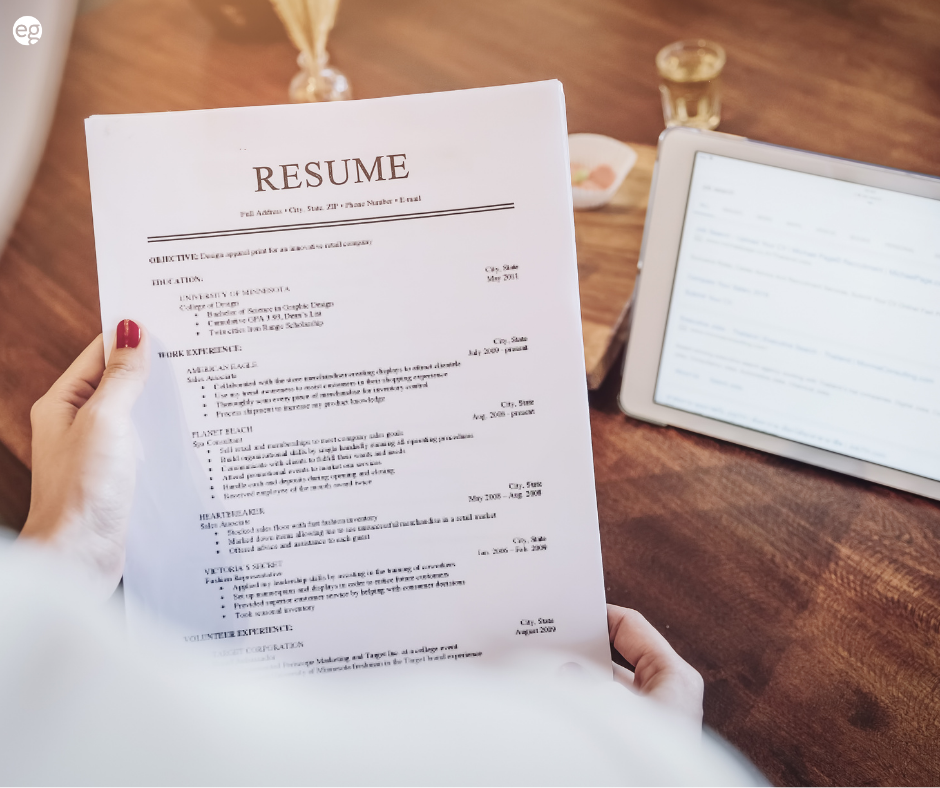How to Write Your First Resume

Having a resume is an essential part of a professional job search. Nearly all applications require a resume for the hiring managers to review. However, if you’ve never written a resume before, the process can seem overwhelming. We’re here to help make the process a bit less daunting with our tips on how to write your first resume.
What to do Before You Write Your Resume
Before you actually start writing your resume, it’s important to think about what skills or experience you have that would be relevant to the type of positions you want to apply for. Start by reviewing job descriptions of positions you’re interested in. What skills are they looking for? What previous experience is required? Make a list of keywords that come up in multiple job descriptions and analyze them against what you’ve done that is relevant, and you’d be able to include them in your resume.
You might also consider holding “informational interviews” with individuals already working in the job you want to get hired into. These informational interviews will allow you to ask questions on what skills and experience come into play regularly, the challenges of the job, and what is most important in the role.
What to Include on Your Resume
After you spend time reviewing job descriptions, analyzing keywords, and learning from current individuals in your desired field, it’s time to write your resume. What should you include?
Your relevant previous experience – Even if you have limited work experience, there are plenty of ways to show what you’ve done in the past can add value to the position you’re applying for. Maybe you’ve completed an internship, done volunteer work, got a certificate in the field, or took a relevant course. Be sure to include any of these if you’ve done them! It will show the hiring manager that you took the initiative to learn more and grow your skills to get into your desired field.
Your skills or achievements – You must include any skills you have related to the position you’re applying for. This is why before you start writing your resume, you took note of all the main keywords from the job descriptions you looked at. You’ll also want to include any relevant achievements you received as well. These don’t have to be a physical reward; it can be when you were “employee of the month,” or maybe you created a new process that made things more efficient, or perhaps you increased outputs in a previous position. Be sure to include anything that you did that added value that you’ve done in the past.
Contact information – This one may seem obvious, but there’s a right and wrong way to do it. Your contact information should be accurate and professional. Make sure the phone number you list you will have access to. Also, make sure you have an email address that sounds professional – avoid using a silly email address with nicknames and stick with using your given name in a first name/last name type format. You can create an email address for free on Gmail.
What Not to Include on Your Resume
There are things you should avoid including on your resume. For example, do not include a photo of yourself; this invites the hiring manager to make assumptions about you before even meeting you. Also, do not include anything that wouldn’t be relevant to the position you are applying for. This means do include any internship or volunteer work you did that relates to the position but leave out the hobbies you enjoy or any awards you have received that have nothing to do with the job.
A hiring manager isn’t spending extended amounts of time reviewing resumes, so sticking with emphasizing the areas that show you’ll bring value to the position is key to making your resume stand out and lead to an interview. Having a concise and direct resume is better than a large resume filled with “fluffy” information that doesn’t relate to how you’d be the best fit for the position.
Writing your first resume can seem daunting, but it doesn’t have to be! Start by analyzing your skills and how they would be relevant to the positions you’re applying for, and then know what you should and shouldn’t include when writing the resume. You should keep it concise and focus on emphasizing how you would add value to the role.
About EG Workforce Solutions
We’ve been in this business for decades and have developed a deep network of professional connections. Whether they’re companies looking for talent, job seekers looking for work, or an up-and-coming store in need of some temporary help, we know the right people to bridge the gap between the hiring and the hired.
But what’s more, we get to know people. From employers hiring to candidates looking, we take the time to listen and learn. We hear your likes, talents, and needs. We gain an understanding, and with it, we’re able to facilitate lasting relationships between businesses and people.
Back to Blog Page




